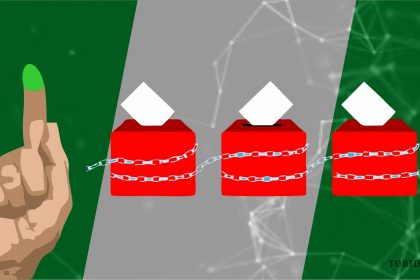Alternative voting ballot for Nigeria electoral system

Unfortunately, such a claim wasn’t only peculiar to the last election but now becoming perpetual to elections in Nigeria. By far, past elections had parented the very pattern which terribly is blotching the credibility of Nigeria electoral system and the country’s image as a whole.
But how can the country improve her electoral system from what she currently has, thence effect and transparency and fairness in its decision making process.
Our main highlight which is but critical is on the voting ballot. Certainly, the part of balloting could be priority on the system’s review, to convince citizens and observers at large that it’s ready to embrace change, or a way forward.
As we can see, the paper ballot type (currently used by INEC) has continuously proven to have fallen short.
The shortcoming of paper ballot, asides the fact it’s becoming obsolete, is that it might not be proficient enough for a country like Nigeria, factored by population and the country land mass (in terms of states, communities) which is but disjointedly massive.
Perhaps, for the meantime, the system could be upgraded to Marksense (Optical Scan). This system works by scanning ballot papers, of which vote count is recorded by computer. When a choice is made by an individual, a computer is made to collate the result of each party by electronically scanning the thumb printed ballot papers. This process could be somehow effective, as electoral officials often make error during vote counting and collation, but a computer-guided collation could be almost error free.
By far, adopting more of technology into the voting process could prove lasting solution that
In February 2014, The Nigeria Central Bank implemented Bank Verification Number (BVN) -an initiative backed by technology- for the purpose of jacking-up banking security and to prevent bank customers from illegal transactions, which today has been able to curb banking fraud significantly.
We are to believe a similar initiative can be adopted by INEC (for
Thankfully, INEC isn’t completely a novice on the part of technology. The commission currently uses technology for biometric registration of voters, for the issuance of smart permanent voters card (PVCs) and for voter verification and authentication (using the smart card reader). INEC former boss, Prof Jega stated these (initiatives) have specifically added value to the integrity of Nigeria elections from 2015.
Even at that, the commision’s image is yet to be salvaged completely. Perhaps it could do more by going
Technology could be comprehensively adapted to manage
Electronic voting machines could take care of vote input, vote recording, data encryption, transmission, electronic consolidation and tabulation of election results. While this would assure transparency (as the system is made to comply with a standard set rule and configured to the highest security with the narrowest room for compromise), it would also prove to be economical and speed up voting process.
Online voting, on the other hand, would allow voters to cast their votes privately from any location and with any device that has internet connectivity (PC, tablet, Smartphone, etc), thereby ensuring maximum engagement including enabling remote and disabled voters to vote.
While it has been observed that only about 20-35
All in all, time could be right for Nigeria to upgrade her voting process, if it’s committed to a better electoral system that decides for all.